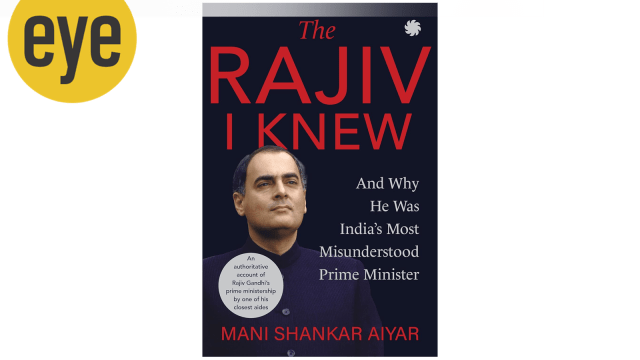Mani Shankar Aiyer’s biography of Rajiv Gandhi misses the personal for the political
The Rajiv I knew, is a partisan but spirited, well-documented account of Rajiv Gandhi's time as the prime minister and subsequently for a brief period also as the opposition leader though it doesn’t answer the question from the subtitle: And why he was the most misunderstood prime minister.
 Aiyar’s account laboriously argues that on the issues of Shah Bano and Bofors, Rajiv Gandhi was not at fault (Amazon.in)
Aiyar’s account laboriously argues that on the issues of Shah Bano and Bofors, Rajiv Gandhi was not at fault (Amazon.in)Mani Shankar Aiyar’s book, The Rajiv I Knew, is a partisan but spirited and well-documented account of Rajiv Gandhi’s time as the prime minister and subsequently, for a brief period, also as the Opposition leader. It doesn’t, however, answer the question from the subtitle — “And why he was India’s most misunderstood prime minister”. The central question about Rajiv is: Does one remember him for the victimhood due to “vicious” media hounding, for the tragic end that left questions of leadership unanswered, for the “accidental” mistakes, or for the (equally accidental?) initiatives that saved and strengthened the nation-state with a democratic spirit of give-and-take? This book leaves the reader with these questions.
The 1980s were a turbulent decade in Indian politics. There were strains in the federal fabric and the decade ended with tearing the communal harmony completely apart. It also saw a vacuum in national leadership with the assassination of Indira Gandhi, the prime minister. Rajiv Gandhi seemed to be filling that vacuum but halfway through his tenure as prime minister, the shine was gone — he was at the centre of troublesome developments. Therefore, an account of his role remains a valuable source of information, insight and, inevitably, controversy.
Aiyar’s account laboriously argues that on the issues of Shah Bano and Bofors, Rajiv Gandhi was not at fault. He points to the judicial pronouncements on these issues vindicating him. While the book also deals with Gandhi’s many domestic and foreign-policy initiatives, somewhat surprisingly, the author underplays his more dramatic initiatives in the very early phase of his leadership — the Punjab, Assam and Mizoram accords as also the initiative in the Gorkhaland issue and his agreement with Farooq Abdullah. Of course, many of these might be set aside as part of the broader policy of the Indian state but Rajiv Gandhi was leading the Indian state at a moment of distrust and uncertainty when the traditional policy of the state could have been easily trampled roughshod. Instead, he contributed to the strengthening of the spirit of democratic compromise through these accords.
Having disposed of the discussion of the accords in just over 30 pages, the book spares a hundred pages to the “controversies” in order to clear Rajiv Gandhi’s name and honour. For a political animal that Aiyar is, it should be evident that no amount of evidence will politically clear the air on these. In terms of Indian democracy and its bygone resilience, the accords showcase the advantage of naivete and optimism, as well as the continuity of the policy of accommodation and inclusivity. While others have written on those accords, an insider-outsider account would have been most welcome.
As this reviewer went through the stout, lawyer-like defence of Rajiv Gandhi over the Shah Bano issue and the strongly documented discussion of Bofors, many intriguing questions crowded the mind — and they are actually farther from those controversies so to speak. Aiyar’s account whets the appetite of the reader for a more convoluted suspense involving human life, party intrigues and democratic politics.
The author seems to convey that Rajiv Gandhi stands apart from the humdrum image of the “leader” because after all, he was a “nice person”: “Because he was a good man, he thought others would be the same,” and “(Perhaps) RG lacked the deviousness that makes for a long-standing prime minister…”. As is well-known, he was catapulted first, into politics and party activity when the Congress was reduced to being only palace conspiracies; then he was catapulted into office without any political preparation or explicit support from the party. Clearly, this was a compromise to avoid a full-fledged war of succession within the Congress and also as a measure to retain fiefdoms of party apparatchiki who mostly lacked popular
support themselves.
This context brings forth the tragic mix of human life and intra-party politics. Aiyar is alive to this mix, being the central character that shaped the time of Rajiv Gandhi as prime minister. But either because he wants to highlight the human dimension of Rajiv Gandhi’s life or because he does not want to ruffle too many feathers within the Congress (as if he has not done that before!), he emphasises the personal side of that tragedy and misses its more political side, viz., the demise of the party.
We are told that there were three factors responsible for Gandhi’s failures: First, Arun Nehru. In no uncertain terms, this book points a finger to his ambition to become the king-maker and the de facto boss. Second, the intransigence of close aides of Rajiv Gandhi whom he trusted — Arun Singh, General K Sunderji, officers such as Gopi Arora, and so on. In fact, somewhat amusingly, the narrative seems to be driving the point that everyone Rajiv Gandhi trusted with key responsibilities either ditched him or even conspired against him.
Third, and politically the most educative point Aiyar makes — alas, only in passing — is that the Congress had already grown tired of its cherished legacy of inclusionary politics (my term; Aiyar sticks to the more misunderstood and nebulous term “secularism”). From PV Narasimha Rao and VN Gadgil to ordinary workers in UP — all were foxed by the question of Ram Janmabhoomi and were willing to cave in. This reviewer believes that this third factor was most critical in understanding the failure of Rajiv Gandhi — and the Congress in the past one decade. Rajiv Gandhi could not bypass the stalwarts nor could he convince and reinvigorate the cadres on this question of principle — a handicap emanating from both lack of experience and lack of deeper legitimacy within the party.
The writer, based in Pune, taught political science



- 01
- 02
- 03
- 04
- 05




























